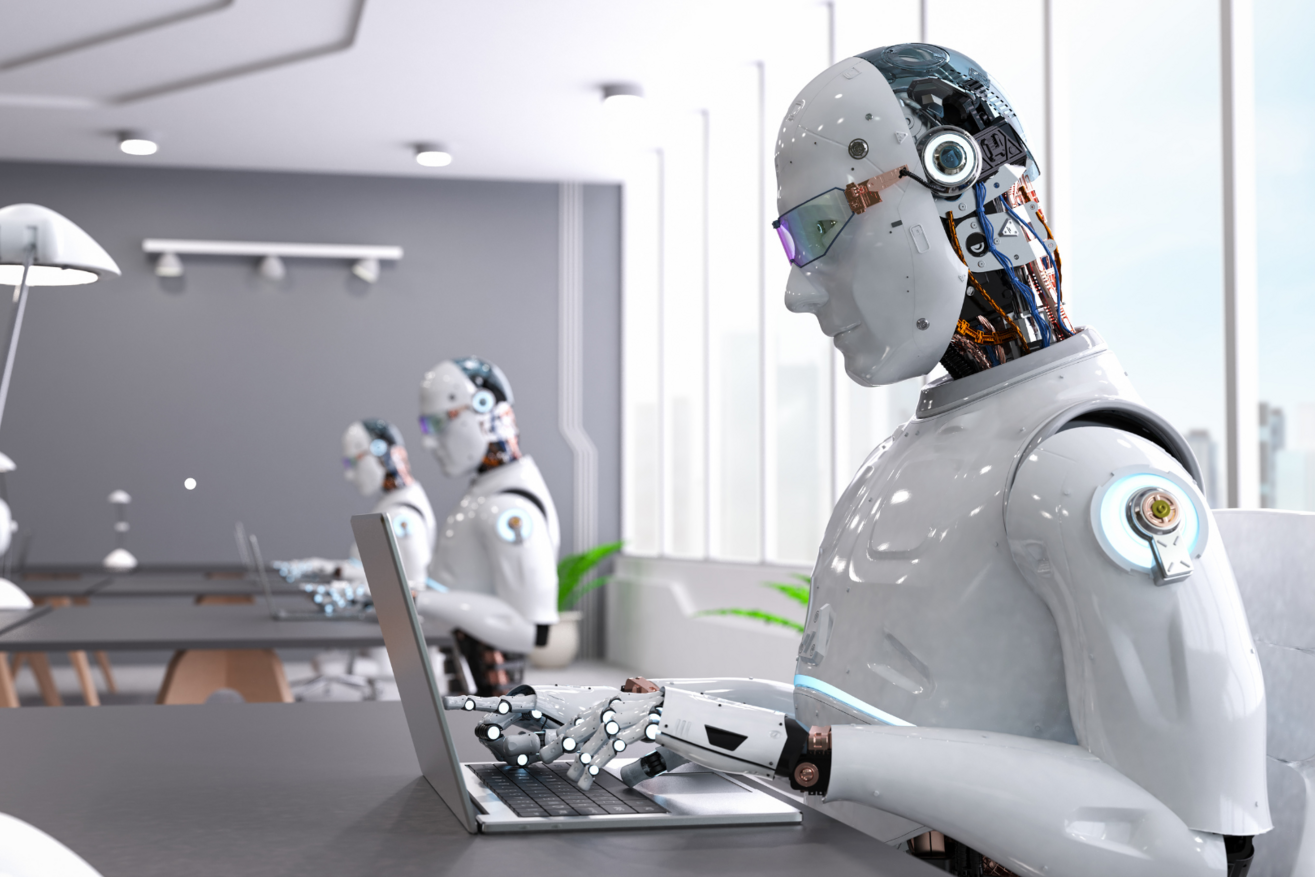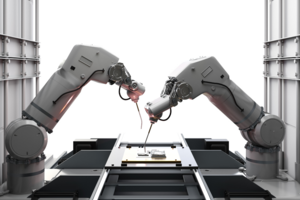Will AI take my job?

Andy Wright, Partner in Odgers Interim’s Technology Practice, examines the impact of AI on various industry and role types, and ponders the question on many people’s minds – is my job going to be replaced by a computer?
2023 will always be the year that Artificial Intelligence exploded on a global scale. In the last 12 months, we’ve seen the unprecedented success of generative AI tools such as ChatGPT, which after its release in November 2022, became the fastest-growing consumer application in history – reaching a million users in just five days. Few now would disagree that AI is here to stay.
Incidentally, at the time of writing, ChatGPT has already been dethroned as the fastest-growing online platform by Threads, Meta’s answer to Twitter, which hit 100 million users in the same timeframe earlier this month.
There are various predictions around the impact AI will have on jobs, ranging from some ‘experts’ arguing it has the potential to destroy humanity, to some convinced that the AI boom will fizzle out. A more likely outcome sits somewhere in the middle.
In March, an economic research note from Goldman Sachs projected that generative AI could eventually increase global GDP by 7% and may do away with or diminish 300 million jobs globally. Of course, it was the 300 million ‘job losses’ that grabbed the headlines. Even the Hollywood TV and film industry recently joined the long wave of groups viewing this as an existential threat, with actors including Cillian Murphy, Emily Blunt and Matt Damon walking out on the premiere of Christopher Nolan’s new picture Oppenheimer, joining a strike over (amongst other things) concerns around the use of AI within their industry.
Undoubtedly, AI will make some kinds of job redundant and significantly reshape others. The hype, however, is most likely overblown in terms of how many jobs it will replace.
Customer service is one of the fields that may experience the biggest impact, as chatbots continue to evolve in sophistication, particularly following the advent of ChatGPT. This Forbes article predicted a 30% reduction in the cost of customer service provision, which would deliver an overall saving of $11 billion per year for businesses worldwide. Whilst there will still be a need for humans – in the form of well-trained customer service agents and leaders – with 80% of basic queries now being addressable by AI chatbots, this is one area where jobs will be affected.
Software engineering is another, with ChatGPT now also a powerful tool for writing code. Indeed, tech site ZDNET recently ran a piece on how to use ChatGPT to do just that. Spoiler alert: the author concluded that if you ask ChatGPT to deliver a complete application, it will fail. However, it can help someone who already knows how to code to build specific routines and get specific tasks done.
More broadly, AI is increasingly being used to streamline and accelerate the design process across various tech domains. In a similar vein to customer service, AI tools will drastically improve the productivity and efficiency of the software engineering function. The difference here is that as engineers become more effective, their overall demand is likely to increase in tandem – as the world becomes more and more digitised, an increasing number of processes, companies, and industries will become tech-enabled, creating the need for more engineering.
Equally, companies that utilise software engineers effectively are likely to generate a greater ROI, in keeping with global GDP expanding alongside AI, as examined in this Tech Republic Article. This means the role of an engineer will only become more important, rather than dwindle and be replaced by technology.
Another area where the impact of AI has long been argued, where we know a thing or two, is the executive search and recruitment industry. For as long as people like myself can remember, many have argued that tools such as LinkedIn had the power to replace the role of an executive search consultant. We’re still here and in demand, for the simple reason that the role we perform can’t be wholly replaced by a computer. Of course there are ways in which we can become more efficient using AI, for instance in speeding up the candidate identification and screening process, as demonstrated in this article. However when we step back and think about what makes us successful, it’s the intangible skill of matching an executive to a business – everything that can’t be quantified on paper, that X-Factor of what makes someone special, and what makes a company tick – which as far as I can predict, isn’t something that can be replaced with technology.
This links into the role of HR within an organisation, and how AI could transform this going forwards. In addition to candidate identification and screening, internal recruitment processes can be optimised using technology in areas such as writing job descriptions and in engaging with a large volume of applicants. These are examined in this article from McKinsey, which also lays out applications of AI to improve training, learning & development, and performance reviews. But as argued before, this doesn’t mean AI will replace an HR professional’s job, particularly in such a people-centric discipline. Instead, technology can enable HR professionals to be more effective, as the function continues to grow in prominence – which ironically, is already being accelerated by the advent of new technologies such as AI, and its transformative impact on the world of work.
This dynamic is similar in another key business function – finance. The role of an accountant within industry is ever-present and not going anywhere. In such a process-driven area, it’s clear that there are many efficiencies to be gained in automating more manual tasks such as data input and reconciliations. These productivity gains can allow a CFO and his or her team to drive more value-add activities, work with increased visibility across an organisation, and continue to advocate the evolution of finance as a true business partner, not just a number cruncher.
One thing often overlooked in this argument is the jobs that AI will create, which the World Economic Forum estimates to be some 97 million. As each company starts to grasp the power of technology as a competitive advantage, roles such as AI engineer and trainer will become more common, and the role of a data scientist will become more prominent. This rapid development also shows why the role of an HR professional, as argued earlier, will be crucial in the new world of work – as new skillsets emerge, roles transform, and employees adapt to align themselves with these.
This alludes to another key dynamic which is crucial in the AI debate, an addressed in the aforementioned Goldman Sachs note – the positive impact and growth that generative AI will have on the world and GDP. One example is in drug discovery, where the utilisation of AI is already accelerating the process – something that will only move faster as AI adoption increases, and technologies such as quantum computing will supercharge immeasurably. In a similar way, AI has the power to transform the Education ecosystem, improving the learner’s experience and with it, educational outcomes. At the risk of sounding utopian, if harnessed correctly AI can help us cure diseases, contribute more to society, and live better lives.
All of these developments, however, are only possible through the harmonisation of human and technology. A symbiotic relationship between the two is crucial as both continue to evolve. For instance, it may come as no surprise that the world’s “new youngest self-made billionaire” Alexander Wang made his money from AI. What is telling however is that his company, Scale AI, makes use of an army of humans in its work training clients’ AI systems. Once again, this highlights the importance of people, and indeed the interplay between people and cutting edge technology. This should be solid evidence that the threat is less whether AI will take our jobs, but whether someone more capable (or willing) to embrace these new technologies could.
Overall, it’s natural to have serious concerns about the unprecedented development of new technologies, and the impact these could have on how we make a living. But, as summarised by Sam Altman, something of an authority in the area as CEO of OpenAI, history does not suggest that having access to better tools will make us work less.
Humans have continually adapted to new technologies, using them to our advantage rather than to our detriment. On this basis there are plenty of reasons to be optimistic we can do the same with this latest, generation-defining wave of technology.







Comments
No comments have yet been posted, be the first to comment by using the form below:
Add your comment